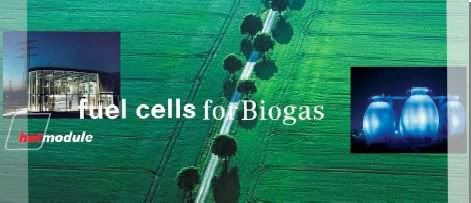Fuel Cell Energy signs 10-year manufacturing & distribution agreement for its biofuel capable fuel cells in South Korea

FuelCell Energy, Inc., a leading manufacturer of highly efficient, ultra-clean, biofuel capable fuel cell power plants for commercial and industrial customers, today announced an expanded agreement with its Korean strategic distribution partner, POSCO (Korea's largest steel manufacturer) and its subsidiary POSCO Power, the country's largest independent power producer, to increase sales in burgeoning Asia-Pacific green energy market.
Under the agreement, POSCO Power will become a provider of FuelCell Energy's Direct FuelCell (DFC) power plants in Korea, and will manufacture the balance of equipment for the plants.
The Direct FuelCell gets its name from the fact that it can use both fossil and biofuels directly without the need to first create hydrogen in an external fuel processor.
Fuel Cell Energy makes components for its better known German partner firm MTU CFC Solutions, which is successfully demonstrating the use of climate neutral biogas in the fuel cells (earlier post, and here on a server farm using the cells for power and cooling). In a combined heat-and-power configuration and with the use of biofuels, this type of fuel cell is arguably the most efficient and cleanest energy system currently in existence.
Under the 10-year license and distribution agreement between Fuel Cell Energy and POSCO Power, the latter will create a fuel cell sales and service organization, and employ its expertise in power plant design and raw materials procurement to reduce power plant costs. Fuel cell stack modules will be manufactured by FuelCell Energy in Connecticut and shipped to Asian customers for installation with POSCO Power balance of plants. POSCO Power also will build a facility to manufacture the balance of plant (non-fuel cell stack portion of FuelCell Energy's DFC power plants) in Korea:
 biomass :: bioenergy :: biofuels :: energy :: sustainability :: climate change :: greenhouse gases :: power :: biogas :: fuel cell :: energy efficiency :: South Korea ::
biomass :: bioenergy :: biofuels :: energy :: sustainability :: climate change :: greenhouse gases :: power :: biogas :: fuel cell :: energy efficiency :: South Korea :: In addition to Korea, POSCO has the right to sell DFC power plants worldwide except in North America, Europe, the Middle East and Japan. Capitalizing on POSCO's strong manufacturing capabilities and economies of scale, FuelCell Energy also has the option to purchase POSCO Power's balance of plants for sale to FuelCell Energy's customers in other parts of the world.
"Over the last three years we have forged a strong relationship with FuelCell Energy and are pleased to announce the expansion of our alliance into manufacturing and distribution for the Korean market, and key markets around the world," said Mr. Seung-Woo Lee, President and CEO of POSCO Power Corporation. "We recognize that ultra-clean fuel cell technology will be an important contribution to future environmentally friendly energy production, and we intend to move aggressively to be a leader in this industry."
The Korean Ministry of Commerce, Industry and Energy (MOCIE) has been a strong proponent of Korean energy independence. Last year, MOCIE announced a new renewable energy subsidy program, under which fuel cells powered by biogas and natural gas received subsidies in excess of the amounts allocated to wind power, biomass, and hydro, and second only to solar power. For fuel cells running on natural gas, the current subsidy is $0.28/kilowatt hour (kWh) and $0.023/kWh for those running on biogas, decreasing 3 percent annually for new installations up to a cap of 50 MW. A binding Renewable Portfolio Standards program is expected to be signed into law by 2009. With these policies in place, Korea is slated to become one of the world's leading adopters of clean energy technology.
"Over the past few years, South Korea has emerged as a global leader in the deployment of ultra-clean energy technology," said R. Daniel Brdar, Chairman and CEO of FuelCell Energy. "It is critical for FuelCell Energy to establish a leadership position in this market as a platform for growth in Asia and beyond, and we are confident that POSCO Power is the right partner."
Because the MOCIE subsidy requires that power from renewable sources first be exported to the utility grid, rather than consumed on-site, the law is expected to favor the installation of multi-megawatt power stations rather than smaller, privately-owned plants. POSCO Power, Korea's leading independent power producer (IPP), intends to focus its core marketing efforts in this sector. FuelCell Energy anticipates sales volume in South Korea of approximately 5 to 15 MW over the next several years, while POSCO Power establishes its local manufacturing facilities and continued sales growth for DFC stack modules following POSCO Power's launch of domestically produced balance of plants.
Fuel Cell Energy's ultra-clean fuel cell power plants generate electricity with twice the efficiency of other distributed generation plants of similar size and with virtually no air pollution. The DFC's range in size from 300 kilowatts (kW) to 2.4 megawatts (MW).
 -------------------
-------------------
 Spanish company Ferry Group is to invest €42/US$55.2 million in a project for the production of biomass fuel pellets in Bulgaria.
The 3-year project consists of establishing plantations of paulownia trees near the city of Tran. Paulownia is a fast-growing tree used for the commercial production of fuel pellets.
Spanish company Ferry Group is to invest €42/US$55.2 million in a project for the production of biomass fuel pellets in Bulgaria.
The 3-year project consists of establishing plantations of paulownia trees near the city of Tran. Paulownia is a fast-growing tree used for the commercial production of fuel pellets.









0 Comments:
Post a Comment
Links to this post:
Create a Link
<< Home